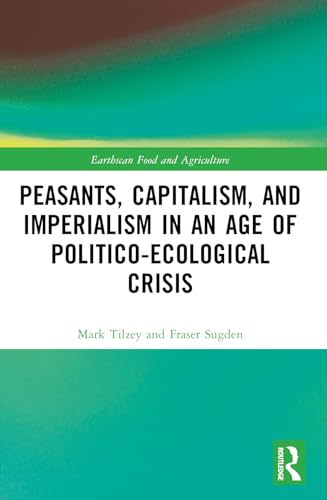
Peasants, Capitalism, and Imperialism in an Age of Politico-Ecological Crisis
Mark Tilzey, Fraser Sugden
Questions & Answers
The book conceptualizes the relationship between peasantry, capitalism, and imperialism in the global South as deeply intertwined and conflictual. It argues that capitalism, particularly in its imperial form, has exploited the peasantry, leading to their displacement and exploitation. The global South's peasantry, due to social disarticulation, often maintains a connection to land for subsistence, contrasting with the formal subsumption of the peasantry in the global North. The book emphasizes the role of the peasantry as both a site of resistance and a potential agent for transformative change. It posits that the peasantry's connection to land and traditional ways of life makes them a crucial force in addressing the politico-ecological crisis, advocating for a "peasant way" that emphasizes sustainability and livelihood sovereignty as a path towards a post-capitalist, agrarian-based social system.
The book discusses various paths of agrarian transition to and within capitalism, differing significantly between the global North and South. In the North, the "farmer road" leads to capitalism, characterized by state support for agriculture and the transformation of the peasantry into a proletariat or commercial farmers. This is contrasted with the "Junker road" in the South, where feudal estates are converted into capitalist plantations, leading to the dispossession of peasants and the creation of a wage workforce.
The South also experiences "partial proletarianization" and "petty commodity production," where peasants remain linked to land for subsistence but are partially integrated into the market. Another path is the articulation between feudalism and capitalism, with peasants retaining land for subsistence while also engaging in market-oriented production.
In the South, these transitions are often accompanied by resistance and conflict, while in the North, the peasantry is more likely to be co-opted into capitalist structures through consumerism, nationalism, and welfare policies. The North's transitions are generally smoother, with less resistance, while the South's are more contentious and disruptive.
The book analyzes the peasantry's role in shaping and resisting capitalist and imperialistic dynamics by examining their interactions with state, class, and imperialism, especially in the context of contested transitions to agrarian capitalism. It identifies several key aspects:
-
Peasantry as a Class: The book emphasizes the peasantry as a distinct class with its own interests, which often conflict with those of the capitalist class. It distinguishes between different strata of the peasantry, such as the lower, middle, and upper peasantry, and examines how their positions and strategies differ.
-
Contested Transitions: The book focuses on the contested nature of transitions to agrarian capitalism, where the peasantry plays a crucial role in shaping these transitions. It explores the various paths of transition, such as the "farmer road" and the "Junker road," and examines how the peasantry responds to these changes.
-
Resistance and Struggle: The book highlights the peasantry's role in resisting capitalist and imperialistic dynamics through various forms of struggle, including protests, rebellions, and land rights movements. It shows how the peasantry's resistance can lead to significant changes in agrarian relations and political landscapes.
-
Peasantry and Sustainability: The book also examines the peasantry's potential as a force for social and ecological sustainability, emphasizing their commitment to meeting fundamental needs, communal values, and ecological boundaries. It suggests that the peasantry's strategies for autonomy and livelihood sovereignty can offer alternatives to capitalist and imperialistic systems.
The book's analysis suggests that capitalism and imperialism are fundamentally unsustainable due to their reliance on externalizing ecological and social costs. The peasantry, particularly in the global South, plays a crucial role in addressing this crisis. Their commitment to meeting fundamental needs, communal values, and ecological sustainability offers an alternative to capitalist and imperialist systems. The book argues that the peasantry can serve as an agent of emancipatory change, promoting livelihood sovereignty and agroecological production. This shift could lead to a more sustainable and equitable social and environmental future, challenging the dominant capitalist and imperialist models. The book emphasizes the need for a broader understanding of the peasantry's role in rural movements and their potential to drive transformative change.
The book employs Marxist theory to analyze the peasantry and agrarian change by focusing on the mode of production and class struggle. It argues that the mode of production, as defined by social relations of power and class exploitation, is central to understanding agrarian dynamics. The analysis emphasizes the contradictions within modes of production, such as capitalism and feudalism, which lead to class struggle. The peasantry is seen as a key player in this struggle, often resisting capitalist expansion and exploitation. The book also examines the role of the state in facilitating or obstructing agrarian transitions, highlighting the importance of class forces and their interactions in shaping these changes. By applying Marxist theory, the book seeks to uncover the underlying causes of agrarian change and the political dynamics involved in the peasantry's struggle for survival and autonomy.